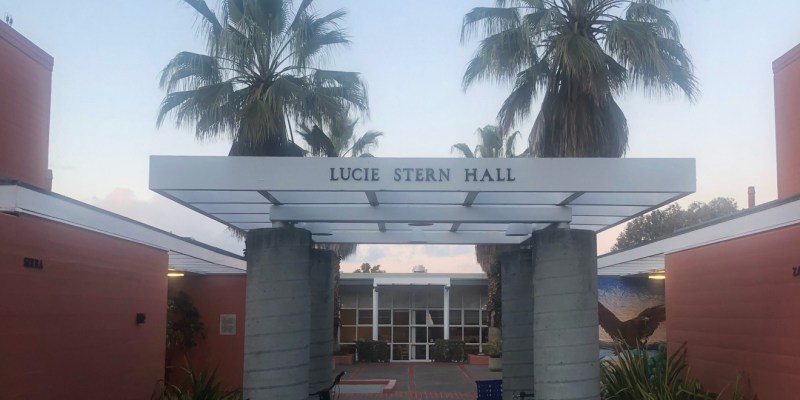A new student identity program titled “Identity Chats Plus Chocolate” was created in the Rinconada frosh dorm this quarter in response to concerns brought up by residents following the annual “Crossing the Line” event held in November. Students and staff said there were no official mechanisms in place to continue the conversations provoked by the event, so they created the weekly talks to have a dedicated space for such dialogue. Topics so far have included gender and sexuality, and all students in the dorm are invited to participate.
Some students had concerns with discrepancies between how different freshman dorms mandated “Crossing the Line,” from the differing percentages of students participating in each dorm to the time of year when each dorm chose to host the event.
“Crossing the Line” is an activity in which participating students gather silently on one side of a line and then cross over the line as individuals when a facilitator reads a statement that a given individual believes to be true about themselves. Although not unique to Stanford, “Crossing the Line” was implemented at the University in the 1980s. According to the Diversity and First-Generation Inclusion Office’s website, the traditional frosh dorm activity is “a tool for promoting reflection, dialogue, empathy and authentic engagement.”
Rinconada Resident Assistant (RA) Janet Coleman-Belin ’19 said she started a follow-up identity program to Crossing the Line after residents came into her room to debrief following the activity.
“People had such strong reactions to ‘Crossing the Line’ … It was a really interesting discussion, so we’ve decided to pay it forward with an identity program,” Coleman-Belin said.
The “Identity Chats Plus Chocolate” chats are based loosely on the course “PSYCH 103: Intergroup Communication,” and Coleman-Belin said the chats have been particularly beneficial because people who were unable to attend “Crossing the Line” get the opportunity to participate.
One issue that Coleman-Belin has run into with the identity chats, however, is being denied access to the “Crossing the Line” questions. Although students wanted to delve into particularly polarizing and personal questions from the activity, Coleman-Belin said, she was instead referred to a list of themes to discuss by Residential Education.
“It would be nice to make the questions available afterwards to dorm staff if we’re looking to push it forward,” Coleman-Belin said. “I think that while reception was really favorable to the idea that we were going to continue with it, I didn’t really feel the support to actually make something happen.”
A lack of follow-up activities after “Crossing the Line” was also a concern for students outside of Rinconada.
“I don’t think that anything is effective [after just] once,” said Otero resident Liz Awad ’22.
While Awad highlighted benefits from the activity, including the apparent bonding of the dorm due to the shared experience that helped them “not only recognize the differences, but also embrace them,” she said she still believes the dorm’s increased intimacy after “Crossing the Line” lasted for only a week “and then was never really brought up again,” despite the program’s aims of long-term impact.
“Things that we learned about people were never addressed again, whether that be ‘I take medication every day’ or ‘I’ve said racist comments,’” Awad said. “[Crossing the Line] is just never brought up again, which just doesn’t make any sense.”
An anonymous Serra resident had a less favorable perspective than Awad on her dorm’s “Crossing the Line” session, held on Jan. 24. She said the activity instead “created more separate communities and made people feel more alone.”
The Serra resident echoed other students’ sentiments regarding the need for additional dialogue following “Crossing the Line.”
“You can’t expect students to process everything that they just witnessed within a mere few minutes without sparking conversation and doing a follow up … If they are going to do an activity like this, they should have made a more efficient, comfortable and safe space,” she said.
In addition to concerns about the environment during and after the activity, students mentioned issues with some of the prompts given and the manner in which they were proposed, similar to the concerns of the Rinconada residents.
The Otero resident offered a suggestion to resolve some of the issues, saying prompts “could have been chosen better.” She highlighted one such prompt: “Cross the line if you don’t feel connected to anybody in your dorm.”
“I think that’s problematic,” she said. “Obviously people only cross the line if they want to, but I don’t think that should have even been a question … It makes people feel bad, and I don’t know if that’s healthy.”
With regard to similarly personal questions, the Serra resident was also concerned with the short amount of time that students were given to make a decision to cross the line.
“People are not going to cross the line quickly when it comes to very intimate questions; they need to think,” she said.
In contrast, Coleman-Belin said she believes the activity was predominantly beneficial.
“People who had wanted to reveal something about themselves to the dorm had an opportunity to do so, and really appreciated the sort of low-commitment, crossing the line, as opposed to having to go around and talk to every individual,” she said.
“I think the power is in the silence and just having to make that decision,” Coleman-Belin added.
Contact Emma Smith at esmith11 ‘at’ stanford.edu and Dilan Nana at dilan99 ‘at’ stanford.edu.
